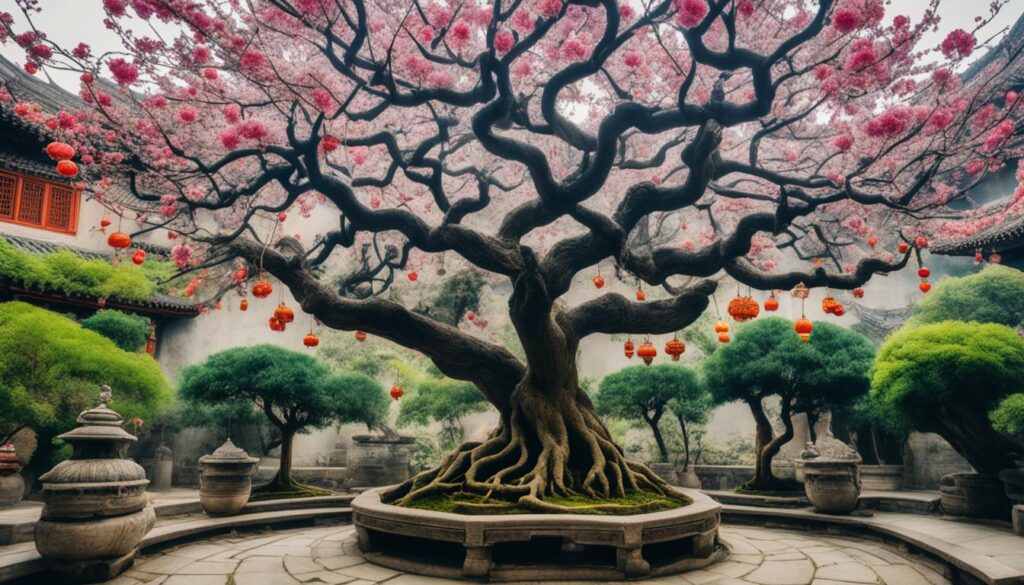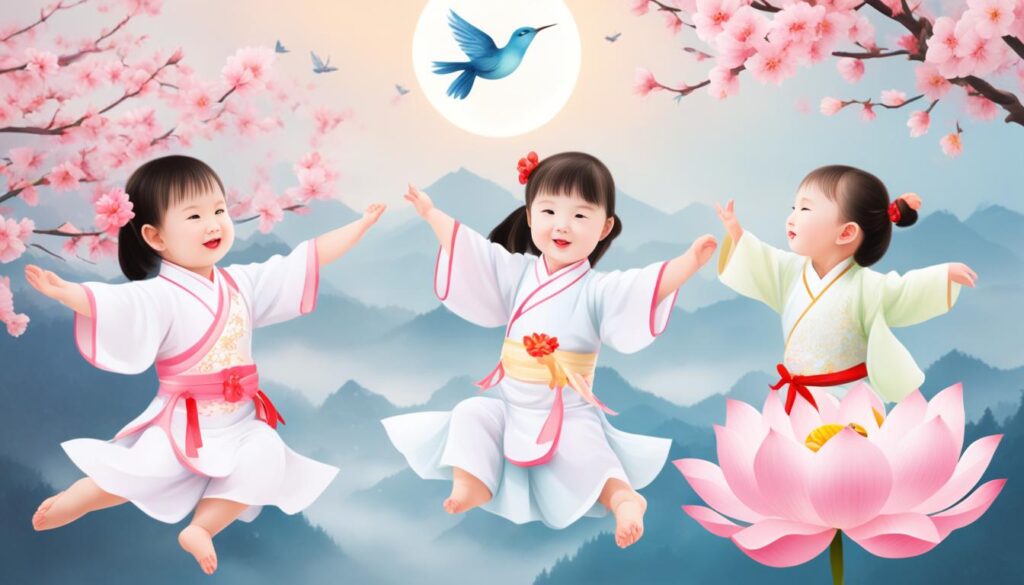
Graceful Chinese Girl Names to Inspire You
Choosing a name for your newborn is an exciting journey. The world of Chinese girl names offers many beautiful options. From historic traditional Chinese girl names to fresh modern Chinese girl names, each has its own story.
Delve into the elegance and cultural richness of beautiful Chinese girl names. Each name reflects character and grace. Whether you prefer something timeless or unique, the process is as meaningful as the life it honors.
The top Chinese girl names are full of life and lasting resonance. They range from serene ancient Chinese girl names to lively modern ones. Find a name that fits your daughter perfectly, filled with meaning and guidance for her life.
Key Takeaways
- Chinese girl names are steeped in cultural beauty and depth.
- There’s an interplay between tradition and modernity in naming conventions.
- Each name is laden with profound meanings, reflecting virtues and aspirations.
- Naming is a significant part of Chinese heritage and carries philosophical significance.
- Discovering a name is as much about its beauty as it is about its ability to inspire a destiny.
The Beauty and Significance of Chinese Girl Names
Giving a child a name is a special ritual with deep roots in history and meaning. The cultural significance of Chinese girl names is incredibly deep, tied closely to family and society.
Understanding the Cultural Significance
In China, a name means so much more than just a way to call someone. It is a symbol of heritage, reflecting the symbolism in Chinese girl names chosen by parents. The name represents hope for success and happiness, showing the parents’ dreams and the wisdom from old traditions. It highlights the value of family connections and the person’s place in the wider cultural story.
Mei (美) – Meaning “beautiful.”
Ling (玲) – Signifying “delicate” or “dainty.”
Jia (佳) – Meaning “good,” “fine,” or “praiseworthy.”
Huan (欢) – Signifying “joyful” or “happy.”
Xue (雪) – Meaning “snow,” symbolizing purity and calm.
Fang (芳) – Meaning “fragrant” or “virtuous.”
Yue (月) – Meaning “moon,” symbolizing beauty and serenity.
Qing (晴) – Meaning “clear sky” or “sunny,” often chosen to signify clarity and brightness in life.
Hui (慧) – Meaning “wise” or “intelligent.”
Ning (宁) – Meaning “peaceful” or “tranquil.”
Lan (兰) – Meaning “orchid,” representing love, beauty, and elegance.
Chun (春) – Meaning “spring,” symbolizing new beginnings and renewal.
Xin (欣) – Meaning “happy” or “joyful.”
Lei (蕾) – Meaning “bud” or “blossom,” symbolizing potential and new life.
Tao (桃) – Meaning “peach,” a symbol of longevity and immortality.
Shuang (霜) – Meaning “frost,” symbolizing purity and clarity.
Fei (菲) – Meaning “luxuriant,” “blooming,” or “magnificent.”
Juan (娟) – Meaning “graceful” or “beautiful.”
Luo (洛) – Derived from the Luo River, suggesting a flowing, smooth life.
Min (敏) – Meaning “quick,” “clever,” or “sharp.”
The Art of Choosing a Harmonious Name
Selecting a harmonious Chinese name is considered an art. It’s not just about how the name sounds or its characters. The goal is for the name to bring balance and good energy to the child’s life. Experts in feng shui and astrology might be asked for advice. They help make sure the name fits well with the universe’s forces and the child’s natural elements.
An (安) – Meaning “peace,” “safe,” symbolizing security and tranquility.
Bo (波) – Meaning “wave,” representing flexibility and movement.
Chen (晨) – Meaning “morning,” a symbol of new beginnings and freshness.
Dai (黛) – Meaning “black for eyebrow makeup,” suggesting grace and beauty.
En (恩) – Meaning “grace,” “kindness,” symbolizing favor and blessings.
Fen (芬) – Meaning “fragrance,” a symbol of a pleasing and delightful character.
Gui (桂) – Meaning “cassia,” “laurel,” symbolizing honor and high status.
Hai (海) – Meaning “sea,” representing vastness and depth.
Jin (晋) – Meaning “advance,” symbolizing progress and prosperity.
Kai (凯) – Meaning “victorious,” a symbol of triumph and success.
Li (丽) – Meaning “beautiful,” representing physical and moral beauty.
Ming (明) – Meaning “bright,” symbolizing intelligence and clarity.
Nuan (暖) – Meaning “warm,” suggesting warmth and affection.
Qi (启) – Meaning “to enlighten,” representing inspiration and enlightenment.
Rui (瑞) – Meaning “auspicious,” a symbol of good omens and fortune.
Shan (珊) – Meaning “coral,” symbolizing preciousness and value.
Ting (婷) – Meaning “graceful,” representing elegance and poise.
Wei (伟) – Meaning “great” or “mighty,” symbolizing strength and greatness.
Xiu (秀) – Meaning “elegant,” “graceful,” representing beauty and refinement.
Yan (燕) – Meaning “swallow (bird),” symbolizing the coming of spring and joy.
Symbolism and Meaning in Names
A name brings many meanings and expectations with it. Names that reflect nature or qualities like wisdom, beauty, and strength are especially valued. The meaningful Chinese girl names chosen provide a positive and powerful identity for the child. They guide her through life with both softness and undeniable force.
Ai (爱) – Meaning “love,” symbolizing affection and kindness.
Bao (宝) – Meaning “treasure” or “precious,” reflecting the cherished status of the child.
Chun (春) – Meaning “spring,” symbolizing renewal and new beginnings.
Duan (端) – Meaning “upright,” “honest,” representing integrity and moral rectitude.
Enxi (恩熙) – Meaning “gracious delight,” a combination that emphasizes kindness and joy.
Fang (芳) – Meaning “fragrant,” representing the hope for a pleasant and respected life.
Hui (慧) – Meaning “intelligent” or “wise,” symbolizing keen intellect and insight.
Jiao (娇) – Meaning “delicate,” “charming,” reflecting grace and beauty.
Ke (可) – Meaning “commendable,” “praiseworthy,” symbolizing approval and respect.
Lian (莲) – Meaning “lotus,” symbolizing purity and beauty emerging unscathed from adversity.
Mei (美) – Meaning “beautiful,” representing physical and moral beauty.
Ning (宁) – Meaning “peaceful,” symbolizing serenity and stability.
Pei (佩) – Meaning “admire,” reflecting the aspiration for a life that others respect and admire.
Qi (琪) – Meaning “fine jade,” symbolizing preciousness and value.
Rong (荣) – Meaning “glory,” “honor,” representing a life of distinction and pride.
Shu (舒) – Meaning “comfort,” “ease,” suggesting a smooth and peaceful life.
Tian (甜) – Meaning “sweet,” symbolizing a pleasant disposition and life.
Wei (薇) – Meaning “fern,” which in Chinese culture can represent resilience and endurance.
Xin (欣) – Meaning “happy,” “joyful,” reflecting a positive and optimistic spirit.
Yue (月) – Meaning “moon,” symbolizing quiet beauty, mystery, and the celestial connection.
Roots and Evolution of Chinese Girl Names
Exploring the evolution of Chinese girl names gives us clues about history, both old and now. These names are more than just words. They reflect a society’s changes, carrying the depth of China’s cultural journey.
Lian (蓮) – Meaning “lotus,” symbolizing purity and beauty in Chinese culture.
Jing (靜) – Meaning “quiet” or “still,” reflecting calmness and a serene demeanor.
Fei (菲) – Meaning “luxuriant,” “beautiful,” or “magnificent.”
Xia (霞) – Meaning “rosy clouds,” often used to convey beauty and a hopeful future.
Yan (燕) – Meaning “swallow (bird),” symbolizing the coming of spring and happiness.
Bing (冰) – Meaning “ice,” symbolizing purity and strength.
Chunhua (春花) – Meaning “spring flower,” representing renewal and vitality.
Daiyu (黛玉) – Meaning “black jade,” a name famous from the classic novel “Dream of the Red Chamber.”
Huian (慧安) – Combining “wisdom” and “peace,” reflecting a blend of intellect and tranquility.
Jia (佳) – Meaning “good,” “fine,” or “beautiful,” a popular name that reflects positive qualities.
Ling (玲) – Meaning “delicate” or “clever,” used to describe women with both beauty and intelligence.
Meilin (梅林) – Meaning “plum forest,” symbolizing resilience (as plum blossoms thrive in winter).
Qing (晴) – Meaning “clear weather,” symbolizing good fortune and clarity in life.
Ruo (若) – Meaning “like,” or “as if,” often used in poetic contexts.
Shuyi (淑怡) – Combining “graceful” and “pleasant,” reflecting ideal feminine virtues.
Tingting (婷婷) – Meaning “graceful,” used to describe elegance and poise.
Wen (文) – Meaning “literature” or “culture,” reflecting a scholarly or cultured aspect.
Xinyi (心怡) – Meaning “joyful heart,” symbolizing inner happiness and satisfaction.
Yueying (月英) – Meaning “moon reflection,” a poetic name reflecting quiet beauty.
Zhen (珍) – Meaning “precious,” a name reflecting the value and rarity of the individual.
From Ancient to Modern: A Historical Overview
The story of historical Chinese girl names ties closely to the nation’s cultural identity. Ancient names were meaningful, inspired by nature and virtues. This tradition has shaped modern names, ensuring they’re still full of old values.
Yanxi (燕曦) – Meaning “sunlight that shines upon swallows,” combining nature and light.
Chun (春) – Meaning “spring,” symbolizing renewal and the joy of springtime.
Huan (欢) – Meaning “joyful,” a popular name that conveys a light and happy spirit.
Lihua (丽华) – Meaning “beautiful flower,” a name that merges beauty with nature.
Mingzhu (明珠) – Meaning “bright pearl,” symbolizing something precious and valued.
Qiaolian (巧莲) – Meaning “skillful lotus,” reflecting both artistic ability and beauty.
Rong (蓉) – Meaning “lotus blossom,” a common component in girl names for its elegance and purity.
Shanshan (珊珊) – Often used poetically to denote coral, representing rarity and beauty.
Ting (婷) – Meaning “graceful,” used in names to suggest elegance and finesse.
Xiaolan (小兰) – Meaning “little orchid,” denoting delicacy and a subtle strength.
Yue (月) – Meaning “moon,” associated with the beauty and serene quality of the moonlight.
Zhenzhen (珍珍) – Meaning “precious,” a name that doubles the character to emphasize value and rarity.
Biyu (碧玉) – Meaning “jade,” reflecting high value and moral integrity.
Huifang (惠芳) – Meaning “kind and fragrant,” combining virtue with the pleasantness of scent.
Lanfen (兰芬) – Meaning “orchid fragrance,” a name that is both aromatic and representative of beauty.
Meifeng (美丰) – Meaning “beautiful abundance,” suggesting both physical beauty and richness of character.
Qingge (清歌) – Meaning “clear song,” symbolizing purity and an artistic soul.
Ruolan (若兰) – Meaning “like an orchid,” using the orchid as a metaphor for grace and refinement.
Suyin (素银) – Meaning “plain silver,” a name that suggests unadorned elegance and understated beauty.
Wenling (雯玲) – Meaning “literary jade tinkling,” a complex name that suggests intelligence and the pleasing sound of jade.
Influence of Philosophies on Naming Traditions
The deep impact of philosophies like Confucianism, Taoism, and Buddhism is seen in names. These thoughts have shaped the meanings behind names. Names today strive for balance and enlightenment, showing these ancient principles are still vital.
Dao (道) – Meaning “way” or “path,” reflecting the Taoist focus on following the natural order.
De (德) – Meaning “virtue,” a central concept in both Confucianism and Taoism.
Hui (慧) – Meaning “wisdom,” a common Buddhist virtue reflecting the pursuit of enlightenment.
Jian (健) – Meaning “health” or “strength,” emphasizing the Confucian virtue of self-cultivation.
Liang (良) – Meaning “good” or “conscientious,” a Confucian ideal.
Ming (明) – Meaning “bright” or “clear,” symbolizing clarity of thought and purity of purpose.
Ning (宁) – Meaning “peaceful” or “tranquil,” a value cherished in all three philosophies.
Qi (启) – Meaning “enlighten” or “open,” suggesting the opening of one’s mind and heart to wisdom.
Ren (仁) – Meaning “benevolence,” a key Confucian virtue.
Shan (善) – Meaning “good” or “virtuous,” a basic tenet in Buddhism and Confucianism.
Tian (天) – Meaning “heaven” or “celestial,” reflecting the cosmic order advocated in Taoism.
Xin (信) – Meaning “faith” or “trust,” principles important in all three philosophies.
Yi (义) – Meaning “righteousness,” a critical aspect of Confucian ethics.
Zhen (真) – Meaning “real” or “true,” valued in Taoist and Buddhist practices of authenticity and simplicity.
An (安) – Meaning “safe” or “peaceful,” symbolizing the ideal state of mind and society.
Le (乐) – Meaning “happy” or “joyful,” reflecting the harmonious balance sought in life.
Feng (丰) – Meaning “abundant,” signifying a life of plenty, which is a sign of heaven’s favor in Confucian thought.
Kai (开) – Meaning “open” or “begin,” suggesting new beginnings and opportunities for growth.
Lu (禄) – Meaning “prosperity,” a blessing of good fortune and a successful career, often sought in Confucian society.
Shu (舒) – Meaning “comfort” or “ease,” promoting the Taoist and Buddhist ideals of living in harmony with the world.
The Interplay Between Language and Naming Practices
To really get Chinese naming practices, you must appreciate the language’s complexity. Each character is not just sound, but holds meaning. Naming is an art, seeking the right mix of sounds and meanings.
Meiling (美玲) – Meaning “beautiful jade,” combining beauty and preciousness.
Xiaohong (小红) – Meaning “little red,” symbolizing warmth and vitality.
Yinghua (英华) – Meaning “flower of heroes,” representing excellence and distinction.
Zixuan (子萱) – Combining “child” and a type of herb, suggesting youth and purity.
Qianru (倩如) – Meaning “charming as,” indicating graceful beauty.
Lijing (丽晶) – Meaning “beautiful crystal,” combining clarity and elegance.
Tingting (婷婷) – Meaning “slim and graceful,” emphasizing elegance and poise.
Jingyi (静怡) – Combining “quiet” and “happy,” suggesting serene joy.
Ruoyan (若妍) – Meaning “like a beautiful woman,” combining beauty with delicacy.
Fangfei (芳菲) – Meaning “fragrant flowers,” symbolizing blossoming beauty.
Yijun (怡君) – Meaning “joyful” and “gentleman,” suggesting a noble and pleasant character.
Wenqing (文清) – Combining “literature” and “clear,” indicating intellectual clarity.
Shuhui (淑慧) – Meaning “virtuous and wise,” combining moral and intellectual virtues.
Mengyao (梦瑶) – Combining “dream” and a type of jade, suggesting a precious and dreamy quality.
Xiaotong (晓彤) – Meaning “dawn red,” symbolizing the promise and energy of a new day.
Yuqing (雨晴) – Meaning “rain clears,” suggesting renewal and clarity.
Lingyi (灵依) – Combining “spirit” and “rely on,” suggesting a mystical or spiritual connection.
Zhilan (芝兰) – Meaning “orchid,” symbolizing refinement and grace.
Ruolin (若琳) – Meaning “like a beautiful jade,” combining elegance with preciousness.
Anqi (安琪) – Combining “peace” and “angel,” symbolizing a serene and angelic presence.
Popular Chinese Girl Names and Their Meanings
Finding the perfect name for a daughter is a meaningful journey in China. It involves popular Chinese girl names that carry deep beautiful Chinese names meaning. Every name reflects the parents’ hopes and wishes in its syllables, tones, and characters.
Some top Chinese girl names have been beloved for generations. They stay popular because of the meaningful wishes they carry. These names do more than establish identity. They come with blessings and hopes for the future too.
- Ài (爱) – Love is timeless and this name wishes the bearer a life of love and kindness.
- Chun (春) – It signifies spring, symbolizing fresh starts and growth.
- Jing (静) – Jing aims for peace and calm, invaluable in today’s rush.
- Xiāng (香) – Means fragrance, hinting at a pleasant and sweet nature.
Lì (丽) – Meaning “beautiful,” symbolizing grace and elegance.
Měi (美) – Also meaning “beautiful,” reflecting physical and moral beauty.
Huá (华) – Meaning “flower” or “splendid,” symbolizing brilliance and excellence.
Yán (妍) – Meaning “beautiful” or “graceful,” often used to describe elegance.
Yǔ (雨) – Meaning “rain,” symbolizing renewal and cleansing.
Fēng (凤) – Meaning “phoenix,” a symbol of high virtue and grace.
Zhēn (珍) – Meaning “precious,” indicating something highly valued.
Xiù (秀) – Meaning “elegant” or “outstanding,” reflecting excellence.
Lán (蓝) – Meaning “blue,” often associated with tranquility and depth.
Yīn (音) – Meaning “sound” or “tone,” symbolizing harmony and melody.
Qíng (晴) – Meaning “clear” or “sunny,” indicating brightness and positivity.
Wén (文) – Meaning “literature” or “culture,” reflecting intellectual pursuits.
Shān (姗) – Meaning “graceful,” suggesting elegance in movement and demeanor.
Tóng (彤) – Meaning “red” or “pink,” symbolizing vitality and youth.
Líng (玲) – Meaning “tinkling of jade,” indicating something precious and clear.
Yǐng (影) – Meaning “shadow” or “reflection,” suggesting depth and mystery.
Yàn (艳) – Meaning “gorgeous,” reflecting vibrant beauty and allure.
Yǔ (语) – Meaning “speech” or “language,” symbolizing eloquence and communication.
Jiā (佳) – Meaning “good” or “fine,” often used to indicate something excellent.
Xīn (心) – Meaning “heart,” reflecting deep emotional connections and sincerity.
Meaningful Chinese female names serve as reminders of virtues and world beauty. They show the care parents put into choosing a name. This name will guide their daughter’s character and dreams.
- MingYu (明玉) – Means Shining Jade, symbolizing beauty and purity.
- Lan (兰) – Orchid, for elegance, nobility, and grace.
- Fang (芳) – Fragrant, showing a person’s good character and virtue.
- Hui (慧) – Wisdom, indicating intelligence and sound judgment.
Yǔjīng (玉静) – Meaning “jade calm,” symbolizing purity and tranquility.
Xiùlì (秀丽) – Meaning “elegant and beautiful,” reflecting grace and attractiveness.
Róng (蓉) – Meaning “lotus,” symbolizing purity and beauty.
Shùhuá (书华) – Meaning “scholarly elegance,” indicating intelligence and refinement.
Xiǎohóng (小红) – Meaning “little red,” symbolizing vibrancy and youth.
Qiáng (强) – Meaning “strong,” reflecting strength and resilience.
Yùhuá (玉华) – Meaning “jade flower,” symbolizing precious beauty.
Yánhuì (艳慧) – Meaning “bright and wise,” indicating intelligence and radiance.
Xīnméi (心美) – Meaning “beautiful heart,” reflecting inner beauty and kindness.
Língyún (凌云) – Meaning “soaring cloud,” symbolizing high aspirations.
Qīnglàn (清蓝) – Meaning “clear blue,” symbolizing purity and depth.
Zhū (珠) – Meaning “pearl,” reflecting preciousness and purity.
Yìfēng (艺丰) – Meaning “artistic and abundant,” indicating creativity and prosperity.
Mèngyáo (梦瑶) – Meaning “dreamy jade,” symbolizing beauty and preciousness.
Yúnxī (云曦) – Meaning “morning cloud,” symbolizing new beginnings and brightness.
Jīng (晶) – Meaning “crystal,” reflecting clarity and purity.
Wěi (玮) – Meaning “precious jade,” indicating something valuable and rare.
Huìyǔ (慧语) – Meaning “wise words,” symbolizing intelligence and eloquence.
Líng (灵) – Meaning “spirit” or “soul,” indicating a lively and intelligent character.
Yǎn (燕) – Meaning “swallow (bird),” symbolizing grace and freedom.
Each name in this beautiful array can shape the bearer’s life and personality. It’s a legacy filled with beauty and wisdom from parents to daughters. They carry names that tell stories, far beyond just being a label.
How to Choose a Graceful Chinese Name for Your Daughter
Choosing a Chinese name for your daughter is a beautiful journey. It mixes ancient culture and your hopes for her. This process connects her with the universe’s rhythm and honors your ancestors. Picking her name carefully means it will bring peace, luck, and a strong bond to your family’s history.
Yǐngyuè (映月) – Meaning “reflecting moon,” symbolizing beauty and serenity.
Mèilíng (美玲) – Meaning “beautiful jade,” reflecting elegance and preciousness.
Ruìyún (瑞云) – Meaning “auspicious cloud,” symbolizing good fortune and blessings.
Xiǎoróng (小蓉) – Meaning “little lotus,” representing purity and grace.
Qīnghuá (清华) – Meaning “pure splendor,” indicating clarity and excellence.
Xīnài (心爱) – Meaning “beloved,” reflecting deep affection and endearment.
Yǎqián (雅倩) – Meaning “elegant and beautiful,” symbolizing sophistication and charm.
Yùxī (玉曦) – Meaning “jade dawn,” representing purity and new beginnings.
Jǐnghuá (景华) – Meaning “splendid scenery,” reflecting beauty and grandeur.
Língxīn (灵心) – Meaning “spiritual heart,” indicating a lively and kind character.
Róngyuè (荣月) – Meaning “glorious moon,” symbolizing honor and elegance.
Shūqín (淑琴) – Meaning “graceful lute,” reflecting refinement and artistic talent.
Wénjīng (文静) – Meaning “cultured and quiet,” indicating intellectual and peaceful qualities.
Yànyuè (艳月) – Meaning “bright moon,” symbolizing radiance and clarity.
Zhēnní (珍妮) – Meaning “precious,” reflecting value and cherished qualities.
Lìhuá (丽华) – Meaning “beautiful flower,” symbolizing beauty and grace.
Yùzhēn (玉珍) – Meaning “jade treasure,” indicating something precious and valuable.
Jiārú (佳如) – Meaning “excellent,” reflecting high standards and admiration.
Xīnyī (心怡) – Meaning “joyful heart,” symbolizing happiness and contentment.
Yùlì (玉丽) – Meaning “jade beauty,” representing elegance and grace.
Consulting Astrologers and Feng Shui Masters
It’s common to ask astrologers and feng shui masters for help with names. They understand the hidden forces at play when your daughter was born. They aim to find a name that’s pleasant to hear and matches her inner energy. This could help her live a life full of success and happiness.
Yǎrù (雅如) – Meaning “elegant and gentle,” symbolizing grace and serenity.
Mǐngyáo (明瑶) – Meaning “bright jade,” reflecting clarity and preciousness.
Ruòxīn (若心) – Meaning “like the heart,” symbolizing sincerity and kindness.
Qínglàn (晴岚) – Meaning “clear haze,” indicating brightness and mystique.
Xiǎoyuè (小月) – Meaning “little moon,” symbolizing gentleness and tranquility.
Jiāróng (嘉容) – Meaning “excellent and graceful,” reflecting high moral standards and elegance.
Zhēnlíng (珍灵) – Meaning “precious spirit,” indicating a cherished and lively character.
Língyùn (灵韵) – Meaning “spiritual charm,” symbolizing a mystical and enchanting presence.
Shūhàn (舒涵) – Meaning “comforting and inclusive,” reflecting a caring and generous nature.
Yǔxiāo (雨潇) – Meaning “elegant rain,” symbolizing renewal and subtle beauty.
Xīnlíng (心灵) – Meaning “heart and soul,” indicating a deep and compassionate spirit.
Yǎwén (雅文) – Meaning “elegant literature,” reflecting intellectual beauty and refinement.
Qínghuá (清华) – Meaning “pure splendor,” symbolizing excellence and purity.
Róngxiù (荣秀) – Meaning “glorious elegance,” reflecting dignity and charm.
Yùchéng (玉成) – Meaning “jade accomplishment,” symbolizing purity and success.
Xīnyíng (欣瑛) – Meaning “joyful crystal,” reflecting happiness and clarity.
Yíxiáng (怡香) – Meaning “pleasant fragrance,” symbolizing a delightful and refreshing presence.
Zhǐxiáng (芷香) – Meaning “angelica fragrance,” indicating grace and elegance.
Jīnghán (晶涵) – Meaning “crystal and inclusive,” reflecting clarity and generosity.
Rúyún (如云) – Meaning “like a cloud,” symbolizing freedom and a peaceful nature.
Considering Birth Elements and Astrology
The natural elements and stars heavily influence our lives in Chinese culture. Considering birth elements in names involves balancing water, wood, fire, earth, and metal with the zodiac. This powerful mix impacts her character and destiny. So, it’s vital to keep these factors in mind. They add richness and context to her name.
Shuǐlíng (水玲) – Meaning “water jade,” symbolizing purity and fluidity, balancing the water element.
Mùyáo (木瑶) – Meaning “wooden jade,” reflecting stability and growth, representing the wood element.
Huǒyàn (火焰) – Meaning “flame,” symbolizing passion and energy, associated with the fire element.
Tǔróng (土荣) – Meaning “earthly glory,” indicating stability and nourishment, connected to the earth element.
Jīnqí (金琪) – Meaning “golden jade,” reflecting preciousness and resilience, linked to the metal element.
Shuǐyùn (水韵) – Meaning “water charm,” symbolizing fluid grace and adaptability.
Mùyǔ (木雨) – Meaning “wooden rain,” reflecting nourishment and growth.
Huǒhóng (火红) – Meaning “fire red,” symbolizing warmth and vibrancy.
Tǔméi (土美) – Meaning “earthly beauty,” indicating groundedness and attractiveness.
Jīnlíng (金玲) – Meaning “golden bell,” reflecting clarity and preciousness.
Shuǐqīng (水清) – Meaning “clear water,” symbolizing purity and tranquility.
Mùxiāo (木潇) – Meaning “wooden elegance,” reflecting natural beauty and grace.
Huǒlì (火丽) – Meaning “fire beauty,” symbolizing brilliance and passion.
Tǔqīn (土芹) – Meaning “earthly diligence,” indicating hard work and perseverance.
Jīnróng (金蓉) – Meaning “golden lotus,” symbolizing purity and resilience.
Shuǐyīng (水影) – Meaning “water reflection,” symbolizing adaptability and reflection.
Mùfēng (木凤) – Meaning “wooden phoenix,” reflecting rebirth and growth.
Huǒxīn (火欣) – Meaning “fire joy,” symbolizing warmth and happiness.
Tǔxīn (土心) – Meaning “earth heart,” indicating stability and sincerity.
Jīnxiāng (金香) – Meaning “golden fragrance,” reflecting preciousness and elegance.
Integrating Family Heritage and Values
Family history is like a gold thread linking generations. Integrating family heritage into Chinese names honors your ancestors. It fills your child’s name with deep meaning. Your family’s treasured values shine through her name. This creates a lasting legacy of culture and pride in who she is.
Xiǎolán (小兰) – Meaning “little orchid,” symbolizing elegance and nobility.
Yùhuì (玉慧) – Meaning “jade wisdom,” reflecting both preciousness and intelligence.
Jiāyīng (嘉英) – Meaning “excellent and brave,” symbolizing high standards and courage.
Zhēnhuá (珍华) – Meaning “precious and splendid,” indicating something highly valued and magnificent.
Yìlín (怡琳) – Meaning “pleasant gem,” reflecting happiness and preciousness.
Lǐhuá (丽华) – Meaning “beautiful and splendid,” symbolizing grace and magnificence.
Měilíng (美玲) – Meaning “beautiful jade,” reflecting elegance and preciousness.
Xīnyuè (心月) – Meaning “heart and moon,” symbolizing inner peace and tranquility.
Yǔqīng (雨晴) – Meaning “rain and clear sky,” symbolizing renewal and clarity.
Rónghuá (荣华) – Meaning “glory and splendor,” reflecting honor and magnificence.
Xiǎoyuán (小媛) – Meaning “little beauty,” symbolizing youth and attractiveness.
Huìlán (慧兰) – Meaning “wise orchid,” reflecting intelligence and elegance.
Jiāhuì (佳慧) – Meaning “excellent and wise,” symbolizing high standards and intelligence.
Qíngyún (清云) – Meaning “clear cloud,” symbolizing purity and tranquility.
Xiùyīng (秀英) – Meaning “elegant and brave,” reflecting grace and courage.
Zhūlián (珠莲) – Meaning “pearl lotus,” symbolizing purity and preciousness.
Línghuá (灵华) – Meaning “spiritual splendor,” reflecting mystical beauty and magnificence.
Yīngxiá (英霞) – Meaning “heroic dawn,” symbolizing bravery and new beginnings.
Měixiáng (美香) – Meaning “beautiful fragrance,” reflecting attractiveness and pleasantness.
Yànróng (艳蓉) – Meaning “bright and glorious,” reflecting radiance and honor.












